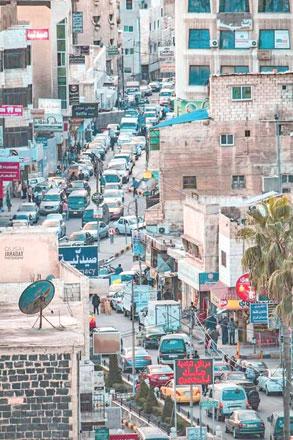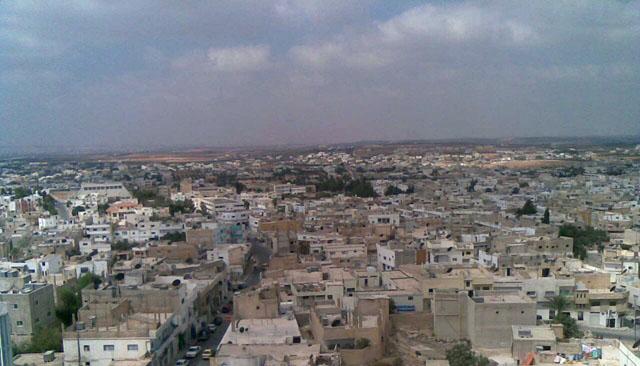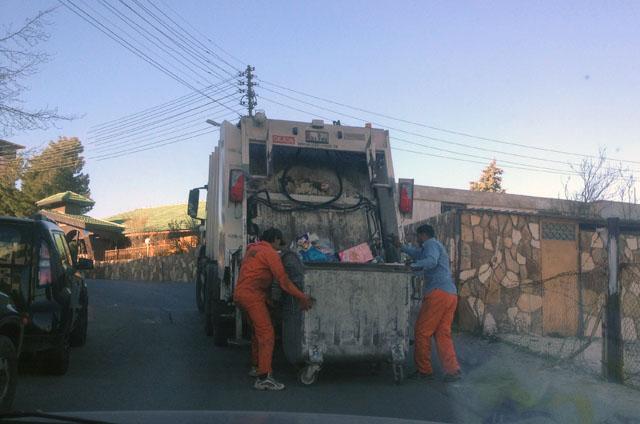You are here
‘Grotesque’ sanitation scene draws public attention to workers’ strike
By Maram Kayed - Oct 11,2018 - Last updated at Oct 11,2018
AMMAN — An ongoing strike by municipality workers around the country, and photos of the subsequent sanitation problems in the governorates have made their way to social media and sparked a debate about the workers’ actions.
Photos of piled garbage blocking streets and sidewalks in Irbid, Karak and Ajloun formed the focus points of the online discussions. The photos, which were described as “disgusting” and “shameful” by many Jordanians, are the result a strike that has been ongoing since Tuesday, paralysing municipality services.
Some municipalities tried to address the problem to an acceptable degree.
In an emergency session held by the Greater Irbid Municipality Council on Thursday evening, in the presence of representatives of employees and workers, both sides agreed to deploy workers and machinery to address the piling garbage problem in the critical areas identified near schools, places of worship and hospitals.
The Jordan Times spoke with residents in various areas. In Karak, the situation was “worse than the pictures”, Ahmad Khreisat, a university student, told The Jordan Times.
“The smell is unbearable. The scene is grotesque. We get that they want their rights, but what about ours?”
People also shared their doubts about the strike’s influence on the government: “All that the strike has done is made the people turn against the workers themselves, not the injustice that has been done to them.
These workers have a field job, not a desk job, so their strike affects the people more than it could ever affect the government,” Tarek Moghrabi, a waiter at a restaurant in Ajloun told The Jordan Times.
People also used the strike as a chance to criticise the quality of municipal services and workers’ performance. “Half of the workers don’t come on time, and the other [half] only does so to pass time. How can they ask for rights when they don’t do their jobs with sincerity?” Malek Aqrabawi said in a Facebook comment.
However, some citizens chose to stand in solidarity with the workers. Mohammed Bani Hani, an Irbid resident, left a Facebook comment on a photo of the sanitation situation in Irbid, saying: “You can’t blame the workers for trying to demonstrate what would happen if they were to abandon their responsibilities. Instead, blame the government that does not care enough to do damage control and clean this up”.
Pro-strike citizens also thought that this was “a clever tactic to twist the government’s arm into responding to the workers’ demands”, as Raghad Omari, a university student from Irbid, told The Jordan Times.
Many Facebook posts and Tweets by citizens said that the attitude of Minister of Municipal Affairs Walid Masri was “the root cause of the problem”. Mohammad Daaja, a municipality worker, said the minister “doesn’t care enough to listen to our demands, so why should we go back to work?”
How long the strike will continue is unclear, even to officials, as President of the General Trade Unions of Workers in Municipalities Hammam Maaytah told The Jordan Times: “Minister of Municipal Affairs Walid Masri is refusing to have any further discussions with the workers as he thinks they are pushing forward some unreasonable demands.”
Related Articles
AMMAN — Workers in the Greater Irbid Municipality on Saturday announced they will suspend their strike as of Sunday.The municipal council de
Sanitation services in northern municipalities are under severe pressure due to the “large” numbers of Syrians residing in host communities, local officials said.
The Greater Amman Municipality (GAM) is thinking of changing sanitation workers’ orange uniforms as the colour is now associated with the Daesh terror group.



















